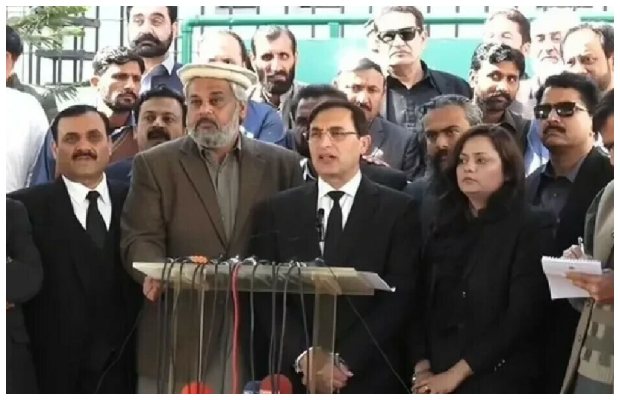ECP rejects Sunni Ittehad Council’s plea seeking allocation of reserved seats
PTI to challenge the verdict in SC

The Election Commission of Pakistan (ECP) on Monday rejected the Sunni Ittehad Council’s plea seeking the allocation of reserved seats.
The ECP has so far kept on hold the allocation of 78 out of the total 226 reserved seats for women in the national and provincial assemblies.
The 4-1 majority verdict, which was reserved last week, was issued by a five-member bench headed by Chief Election Commissioner (CEC) Sikandar Sultan Raja. ECP member Babar Hassan Bharwana dissented from the judgment in an additional note.
In the order issued today, the electoral watchdog said it had given a deadline of Dec 22 for the submission of nomination papers by political parties for reserved seats.
ECP maintained that the deadline was later extended till Dec 24.
“The records revealed that the SIC did not submit a priority list for the reserved seats for women and non-Muslims,” it noted, highlighting that the party requested the commission for the allocation of seats via four letters after PTI-backed independents joined it.
The ECP further stated that the SIC did not contest elections for any seat in the national or provincial assemblies and even the party chairman, Sahibzada Hamid Raza, contested the polls as an independent candidate.
“In Article 51 of the Constitution it is clear that political parties that have representation in the National Assembly by way of winning seats would be eligible for the allocation of reserved seats for women and non-Muslims through a proportional representation system,” ECP said.
It also cited Section 104 of the Elections Act, 2017, which states, “For the purpose of election to seats reserved for women and non-Muslims in an Assembly, the political parties contesting election for such seats shall, within the period fixed by the Commission for submission of nomination papers, file separate lists of their candidates in order of priority for seats reserved for women and non-Muslims with the Commission or, as it may direct, with the Provincial Election Commissioner or other authorized officer of the Commission, who shall forthwith cause such lists to be published for information of the public.”
“Therefore, the commission is of the view that in light of clear provisions of Article 51(6) of the Constitution read with Section 104 of the Elections Act, 2017, SIC is not entitled to claim quota for reserved seats due to having non-curable legal defects and violation of a mandatory provision of submission of party list for reserved seats which is the requirement of law,” the ECP order said.
ECP in its verdict, rejected the SIC’s petition and accepted pleas against the allocation of reserved seats to the council.
“The seats in the National Assembly shall not remain vacant and will be allotted by proportional representation process of political parties based on seats won by political parties,” the order stated and directed the office to calculate the quota of reserved seats accordingly.
On the other hand, ECP member Babar Hassan Bharwana in his dissent note, stated that he “partially” agreed with the other members of the bench that reserved seats cannot be allotted to the SIC as the party had failed to submit priority lists in time.
“However, I have dissenting views concerning the allocation of seats by way of proportional representation to the other political parties.
“In my opinion, Article 51(6-d) and Article 106(3-c) of the Constitution clearly state that reserved seats will be allocated to the political parties based on total number of general seats secured by each political party from the province concerned in the National Assembly or such reserved seats secured by each political party in the Provincial Assembly,” he said.
He added that the seats should therefore remain vacant till the time any such amendment in Article 51 or 106 of the Constitution was made by the Parliament.
PTI to challenge the verdict
PTI’s Barrister Ali Zafar in a speech in the Senate after the verdict was released, said his party would challenge the ECP order.
Barrister Ali Zafar termed the election commission’s judgment “the last dagger in the heart of democracy”.
“If our share is being given to other parties then this is a constitutional mistake that the ECP has committed,” Zafar stressed, highlighting that today’s verdict had proven that the electoral watchdog failed to fulfil its responsibility of holding free and fair elections.
Barrister Ali Zafar subsequently demanded the immediate resignation of the ECP and sought proceedings against the Chief Election Commissioner under Article 6 (treason) of the Constitution.
He added that the PTI had prepared a resolution in this regard which would be presented shortly.






